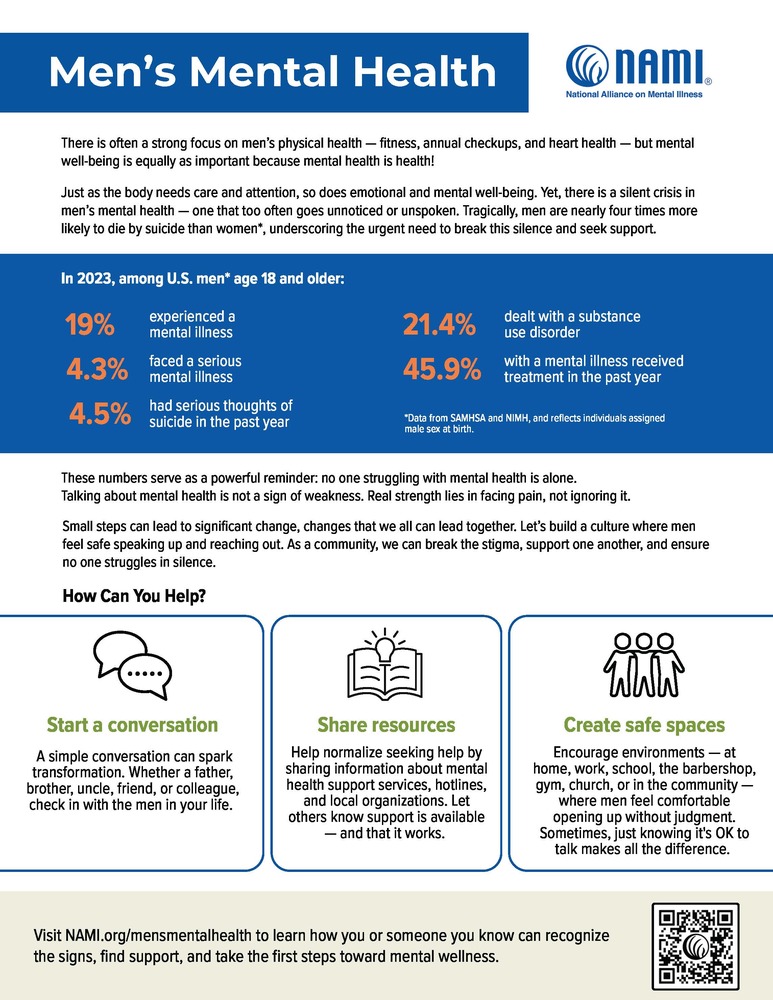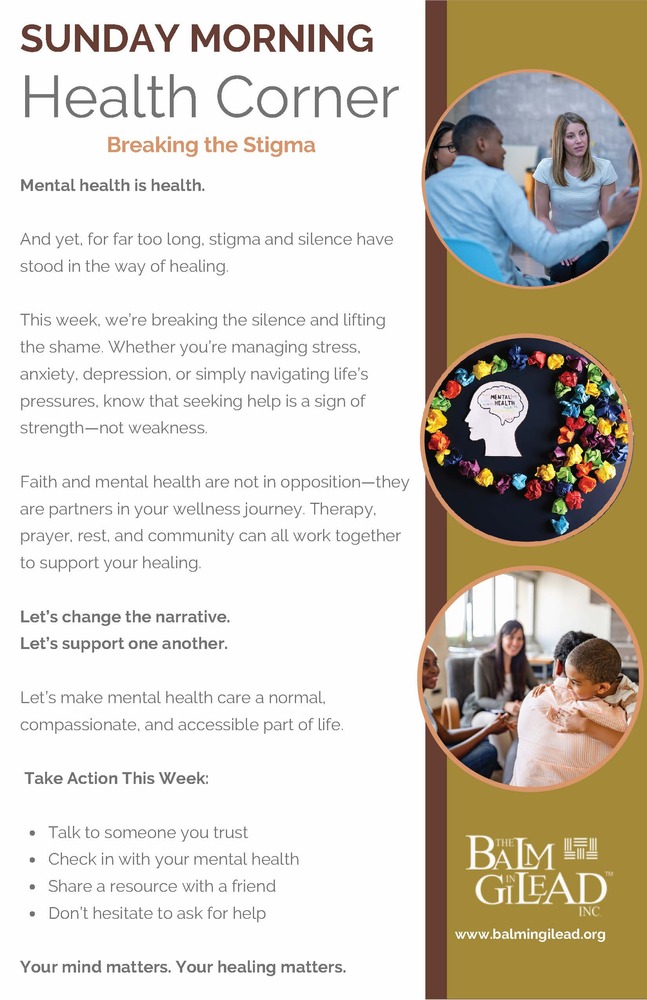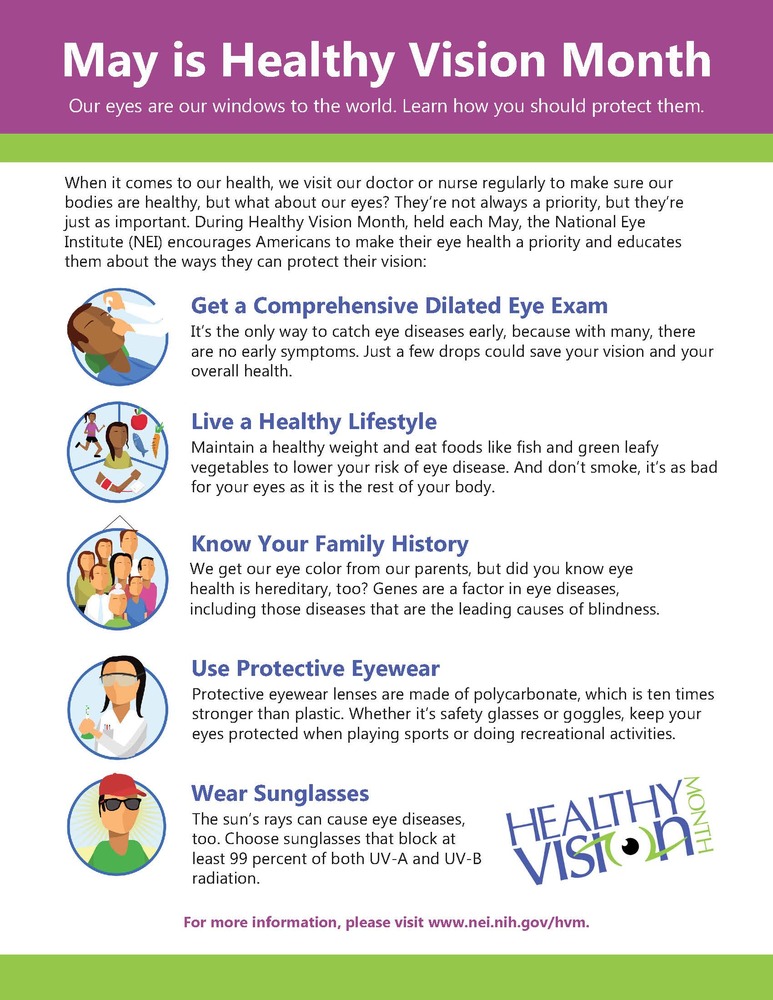Health Education Resources
- Details
- Category: Health Education Resources

June is Men's Health Month, a time to raise awareness about health issues affecting men, particularly Black men, who face unique health challenges and disparities. It’s important as a man to brush up on your health facts, listen to your body and be sure to get regular checkups. Even if you don’t feel sick, it is important to see your doctor regularly and schedule annual exams. Not only will you live longer, but you’ll also have a better quality of life.
To access the recommended screenings for men age 40-65 visit here. Men's Health Month serves as a vital reminder for Black men, and those who love them, to ensure they prioritize their health and wellbeing.
- Details
- Category: Health Education Resources
Turn Awareness into Action: Celebrating Mental Health Month
Mental health is finally getting the attention it deserves in public conversations, helping break down stigma and encouraging open dialogue. This growing recognition is a powerful starting point, but awareness alone isn’t enough to create meaningful change. We can turn this heightened understanding into actions that improve lives—not just on a community level, but
starting with ourselves. What better time than May, Mental Health Month?
starting with ourselves. What better time than May, Mental Health Month?
You have the power to take charge of your mental health and well-being, and it begins with small, intentional steps. By starting with yourself, you can create a ripple effect, inspiring others and contributing to a society where mental health is prioritized and supported.
Let’s dive into how you can take A.C.T.I.O.N. to make improving your mental health a priority in May and beyond:
A - Assess your mental health needs and the resources available to you
Start by taking an honest look at your mental health. Are there areas that need more attention? Consider taking an online mental health test at mhascreening.org to get a clearer picture. Once you’ve identified areas for improvement, make a list of what resources are available to you.
For instance, do you have health insurance? An Employee Assistance Program at your job? Are you a student with services available through school/a university health center? Is there a Mental Health America affiliate located in your area? Or maybe you’re interested in helping yourself and the only resource you need is some internet access to learn about what you can do.
C - Choose a course of action
Based on your needs and available resources, decide on a path forward. This could be anything from starting a daily meditation practice to seeking professional help. Choose something that resonates with you and feels achievable.
T - Take steps toward care
Now it's time to put your plan into action. If you've decided to see a therapist, make that first appointment. If you want to incorporate more exercise for mental well-being, lace up those sneakers and take a walk today.
Start by taking an honest look at your mental health. Are there areas that need more attention? Consider taking an online mental health test at mhascreening.org to get a clearer picture. Once you’ve identified areas for improvement, make a list of what resources are available to you.
For instance, do you have health insurance? An Employee Assistance Program at your job? Are you a student with services available through school/a university health center? Is there a Mental Health America affiliate located in your area? Or maybe you’re interested in helping yourself and the only resource you need is some internet access to learn about what you can do.
C - Choose a course of action
Based on your needs and available resources, decide on a path forward. This could be anything from starting a daily meditation practice to seeking professional help. Choose something that resonates with you and feels achievable.
T - Take steps toward care
Now it's time to put your plan into action. If you've decided to see a therapist, make that first appointment. If you want to incorporate more exercise for mental well-being, lace up those sneakers and take a walk today.
I - Identify additional supports
Remember, you're not alone. Identify people, pets, or even objects that can support your mental health goals. This could be a trusted friend, a support group, or creating a cozy corner in your home for relaxation.
O - Observe what's working... or not
As you implement changes, take time to reflect on their impact. Are you feeling better after a week of daily walks? Or perhaps that meditation app isn't quite clicking for you. Adjust your approach based on what you observe.
N - Nurture yourself
Last but certainly not least, prioritize self-care and emotional well-being. This could mean different things for different people – from making breathing exercises part of your daily routine to attending a community event. The key is to engage in activities that replenish your mental and emotional reserves.
Remember, you're not alone. Identify people, pets, or even objects that can support your mental health goals. This could be a trusted friend, a support group, or creating a cozy corner in your home for relaxation.
O - Observe what's working... or not
As you implement changes, take time to reflect on their impact. Are you feeling better after a week of daily walks? Or perhaps that meditation app isn't quite clicking for you. Adjust your approach based on what you observe.
N - Nurture yourself
Last but certainly not least, prioritize self-care and emotional well-being. This could mean different things for different people – from making breathing exercises part of your daily routine to attending a community event. The key is to engage in activities that replenish your mental and emotional reserves.
Your Mental Health Matters
As we celebrate Mental Health Month, remember that every step you take toward better mental health is a victory. Whether it's a small act of self-care or a big decision to seek professional help, you're contributing to a healthier, happier you.
As we celebrate Mental Health Month, remember that every step you take toward better mental health is a victory. Whether it's a small act of self-care or a big decision to seek professional help, you're contributing to a healthier, happier you.
So, are you ready to turn awareness into A.C.T.I.O.N.? Your mental health journey starts now. Take that first step, however small it may seem. Your future self will thank you.




